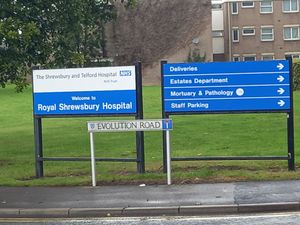Ambulance delays rise at Shropshire's hospitals
Delays facing ambulances handing over patients at Shropshire's two main hospitals have soared since August, new figures show.

West Midlands Ambulance Service (WMAS) said that in 409 cases crews waited longer than an hour to offload patients at Royal Shrewsbury Hospital and Telford's Princess Royal Hospital during October.
It rose from 216 cases in September and 123 in August.
New figures from health commissioners show ambulances were waiting at least half-an-hour on 720 occasions in September, compared to 590 in August.
NHS rules state it should take no longer than 15 minutes.
Dr Julie Davies, director of performance and delivery at Shropshire Clinical Commissioning Group, told a recent meeting of its governance board that the 'physical infrastructure at both sites is a challenge'.
She said the CCG was working closely with a hospital ambulance liaison officer to try and minimise delays.
Dr Simon Freeman, the CCG's accountable officer, told the meeting that the 'bunching of ambulances' – where many have been turning up at the hospitals together, has caused issues.
But he added: "It's unclear why that is happening."
Between April and September, ambulances waited at least half-an-hour at PRH or RSH to hand over patients in 3,726 cases.
In 860 cases, crews waited at least an hour.
WMAS says it tries to give hospitals as much notice as possible about the number of patients it expects to convey there, but in some periods there will be spikes in demand.
Murray MacGregor, spokesman for WMAS, said: "WMAS works closely with all hospitals in the region to tackle handover delays and operates a number of measures to help ensure ambulances are able to offload these patients as quickly as possible.
"At times of peak demand we work with hospitals to minimise delays, however any delay with the handover of patients can have a serious impact on the trust's ability to get to the next patient."
Shrewsbury and Telford Hospital NHS Trust (Sath) says it is continuing to work with colleagues to improve handover times.
Nigel Lee, chief operating officer at Sath, said: “To help us cope with demand we have taken measures to improve work between the hospital ambulance liaison officers and our own handover nurses and A&E staff.
“In 2017/18, we saw an average of around 690 ambulances arriving at our A&E departments every week – almost 100-a-day. Between the start of January and the end of March, that figure rose to nearly 730 ambulances every week. In September, that had risen again to around 735.
“On Wednesday of this week, for example, we saw 34 more ambulances arrive at our A&Es than on the same day last week.
“In the last year, we have seen our highest ever level of A&E demand, with almost 124,000 attendances, as well as our highest ever level of emergency admissions, with a 13 per cent increase from almost 55,200 in 2016/17 to more than 62,500 in 2017/18. We will always focus on clinical priority in our A&Es, treating the most urgent patients first.
“We know from our colleagues working in these areas that our emergency services, split across two sites, are not designed for the 21st century and that a long-term, strategic solution is required. However, our staff continue to work hard to provide the best care possible in very difficult circumstances.
“I would like to once again take this opportunity to thank our own staff and our colleagues at WMAS and the Welsh Ambulance Service for their continued dedication and hard work.”
Sath says it also has a shortage of A&E consultants, middle grade doctors and nursing staff.
Figures for September show just over 70 per cent of patients were seen at the trust's emergency departments within the four-hour target.
The operational standard is that at least 95 per cent of patients attending A&E should be admitted, transferred or discharged within four hours.
Staff shortages have also led to the planned night-time closure of A&E at PRH.
Health bosses were due to meet with representatives from NHS Improvement in Birmingham today to work through the details of how an overnight closure would work.
Sath says the decision can be reversed if additional staff are found.




